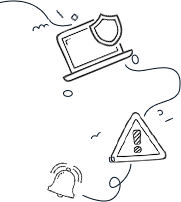Introduction
Think you know about clickjacking? Well, buckle up, because we’re diving into the wild world of DOUBLE clickjacking! If regular clickjacking is like getting pranked by a playful friend, double clickjacking is that friend who suddenly turns into a sneaky ninja while you’re not looking.
In a classic clickjacking attack, you’re tricked into clicking something that *definitely* wasn’t on your to-do list — like a hidden button that leads to a wormhole of unwanted actions. Imagine a bad actor overlaying a transparent page over a legitimate site, making you think you’re clicking on a trusted link, like a friendly neighbor inviting you for cookies but actually leading you to their secret lair.
Now, let’s talk about the twist — the double clickjacking attack. This sinister plot puts the fun in… well, dysfunctional! The hacker tricks you into double-clicking a seemingly harmless prompt. What happens? The first click plays hide-and-seek with the top window, while the second click smacks into something way more sensitive in the parent window. Talk about a classic “now you see it, now you don’t” scenario — awareness is your best friend against these sneaky cyber threats!
How Double Clickjacking Works
This attack is like a magician’s trick gone wrong. It magically slips past traditional clickjacking protections, paving the way for account takeovers and unwanted application permissions. Here’s how it all unfolds:
- Initial Setup: Our villain (the attacker, of course) builds a website with a button that opens a new window displaying an innocent-looking prompt — like a lullaby for your curiosity.
- Triggering the Exploit: When you click on the compromised link, a new window appears, enticing you to double-click somewhere on the landing page. But as the page loads, an invisible webpage sneakily takes the original content’s place, like a magician replacing a rabbit with a… well, a whole lot of nothing!
- Executing the Attack: The first click vanishes or changes the top window, while the sneaky second click lands on the delicate sensitive element in the parent window, unknowingly giving the green light to malicious activities. Voilà! Attack executed!
Now, let’s briefly chat about OAuth tokens. Think of them as your free pass to the VIP section of a club, allowing applications access to your data — without giving away the secret handshake, or your credentials. There are access tokens for API requests and refresh tokens for maintaining your party status by keeping your access tokens fresh and fabulous.
Real-Life Incidents
Let’s take a trip down memory lane with some real-life hijinks. Remember that one time Slack had a close encounter with double clickjacking and OAuth tokens? Bad actors snagged stolen employee tokens, snuck into GitHub repositories, and made off with private code repositories. Luckily, no customer data was harmed, but it’s a classic case of “no free lunch!”
Then there was the not-so-fun targeting of Salesforce accounts. Ah, the infamous hacking group ‘0ktapus’ (who thought that name was a good idea?) laid siege to technology and gaming companies, exploiting misconfigurations in Salesforce communities to access sensitive data and even execute hijinks like account takeovers. Talk about a digital game of tag gone wrong!
So, protect your API keys and OAuth tokens with the same fervor you use to guard your secret cookie recipe! Because remember, unauthorized access is the enemy of fun!
These little escapades exemplify why we need robust security measures, like multi-factor authentication and automatic monitoring for user shenanigans, to keep our digital lives in check.
How Can You Stay Safe?
So, how can you be the superhero of your online presence? By staying informed and using caution, you can fend off these sophisticated attacks like a pro!
- Use Security Headers: Implement security headers like
X-Frame-Options and Content Security Policy (CSP). Think of them as protective shields against potential clickjacking villains!
- Enable Clickjacking Protection in Web Applications: Developers, arm your web applications with clickjacking protections. Many modern frameworks package this feature like a tasty pizza—delivered straight to your door!
- Smart Browser Extensions: Equip your browser with security extensions that can block rogue scripts and frames. Stay current, as browser developers are continually working on updates to keep the digital intruders at bay!
- Use Multi-Factor Authentication (MFA): Turn on MFA for your accounts—it’s like adding an extra lock to the door, making it harder for those pesky attackers to storm in!
- Be Wary of Unusual Requests: If a website asks you to double-click, and you feel a twinge of suspicion, chances are that’s a big red flag waving at you. Protect your clicks like the precious little gems they are!
Stay informed, stay safe online, and as always, don’t fall for just any invisible trick! Keep your digital life sparkling!
The post Double Clickjacking, Toil and Trouble! appeared first on .





